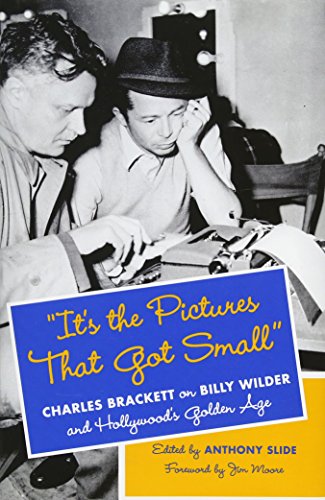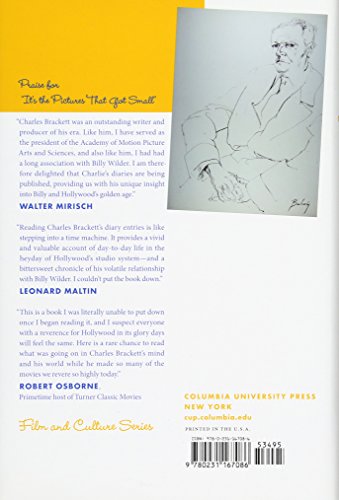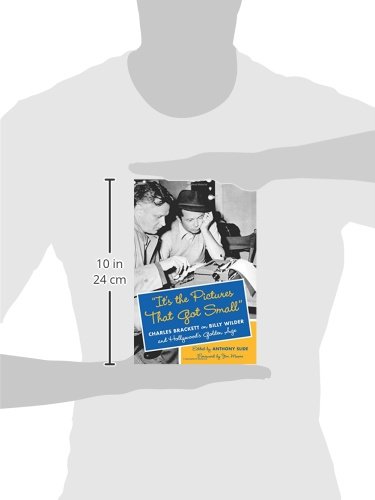Deliver to Morocco
IFor best experience Get the App
معلومات عنا
دعم العملاء
احصل على التطبيق

قم بتوجيه الكاميرا لتنزيل التطبيق
حقوق الطبع والنشر © 2024 Desertcart Holdings Limited
Deliver to Morocco
IFor best experience Get the App




"It's the Pictures That Got Small": Charles Brackett on Billy Wilder and Hollywood's Golden Age (Film and Culture Series)
T**N
Five Stars
Happy with order.
R**S
A revealing explanation of Whack-a-Mole filmmaking in Hollywood, 1932-1949
This is certainly not a book for everyone, or even for those who have only a casual interest in the culture within which films were made almost a century ago. Anthony Slide edited the diaries of Charles W. Brackett (1892-1969), an American novelist, screenwriter, and film producer who collaborated with Billy Wilder (1906-2002) on thirteen movies, including the classics Sunset Blvd. and The Lost Weekend. Wilder was the much more profane of the two partners, while Brackett held to his upper-crust upbringing and Ivy League education (Williams and Harvard). He was known as the "gentleman" of the pair. Their social and cultural backgrounds often clashed, but Brackett acknowledged later in his life that Wilder's baser instincts about human nature were invaluable to their collaboration. By the late 1940s, a schism based on personal, creative, and contractual differences -- one that had been festering for many years -- began to threaten the partnership. Brackett and Wilder split in 1950, upon the completion of Sunset Boulevard.After reading this book whose narrative frequently bogged down in details about where and when Brackett had meals and meetings with whom, with or without Wilder, I have no interest in learning more. That is not Slide's fault. He is primarily a messenger with -- presumably -- an extensively edited message, not a commentator. That said, if you have a keen interest in obtaining answers to questions such as these, here is an excellent source:o What was it like to work with Billy Wilder?o What was it like to socialize with him?o During the given timeframe (1932-1949), what were the defining characteristics of the culture then dominated by the major studies, especially MGM?o During that time, who were the "good guys" (or "gals") and which were not?o Which public figures, external events, developments etc. were affecting the film business?o What is Slide's take on Wilder as a "player"?o What seems to be his opinion of Brackett?o What about Samuel Goldwyn, Louis B. Mayer, and other "tinsel town" moguls?o What about Ernst Lubitsch?o What was an average day (if it can be said there was one) in the Brackett-Wilder collaboration?o On balance, what are the most valuable lessons to be learned about building a successful career off-screen?These comments in Jim Moore's Foreword caught my eye: "For the better part of fourteen years together, they shouted, they pouted, they showed up late, or not at all, they worked at each other's homes, and in bars or restaurants, and on planes, trains, and boats. Charlie's prissiness comes through, as does Billy's churlishness and angst over every little slight or critique from studio leaders. Tempers flare -- as on the day when Charlie, finally fed up with Billy for playing a small flute in the office, snatches the instrument and breaks it in front of Billy."As I suggested earlier, this is not a book for everyone or even for many people who enjoy watching films. But for those such as I, so-called "film buffs" who are keenly interested in knowing more about the people who help make memorable films, material selected from diaries of Charles W. Brackett helps to accommodate that interest.The book's title is a line from the screenplay for Sunset Boulevard, co-authored by Brackett and Wilder, and directed by Wilder. It won seven "Oscars" and nominated for four others in 1950:Best FilmBest Writing, Story and Screenplay (Brackett, Wilder, and D.M. Marshman Jr.Best Art Direction-Set Decoration, Black-and-White (Hans Dreier, John Meehan, Sam Comer, and Ray Moyer,Best Music, Scoring of a Dramatic or Comedy Picture (Franz Waxman)Best Actor in a Leading Role (William Holden)Best Actress in a Leading Role (Gloria Swanson)Best Actor in a Supporting Role (Erich von Stroheim)
ترست بايلوت
منذ يوم واحد
منذ أسبوعين